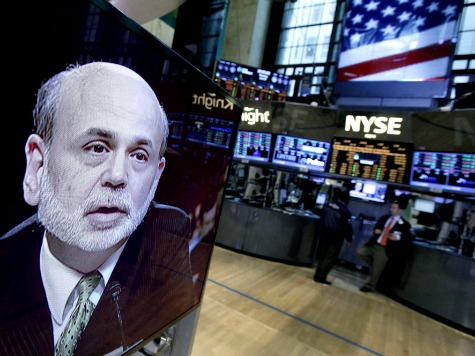
“Free at last, Free at last, Thank God almighty we are free at last.”
— Rev Martin Luther King Jr.
The speculation about who will be chosen by President Barack Obama to succeed Federal Reserve Board Chairman Ben Bernanke has intensified in the waning days of August. Former Treasury Secretary Larry Summers has been touted as the establishment candidate, while Vice Chairman Janet Yellen is the darling of liberals within both parties. The runner up is Donald Kohn, the widely respected veteran staff director who retired from the Fed board in June 2010. At a mere 61 years of age, Kohn would make a good and non-political choice for Fed Chairman.
In an earlier column, “WASHINGTON & WALL STREET: TIME FOR SENATE REPUBLICANS TO DEAL ON FED,” we talked about the approaching vacancies on the Fed board, 3-4 empty seats which are unfortunately going to coincide with the 2014 mid-term elections. At the time, my view was that Larry Summers cannot be confirmed, Yellen is not viewed as sufficiently credible as Chairman, and that former Fed of New York President and Treasury Secretary Timothy Geithner would be the Obama fall back choice.
Last week on Bloomberg Radio with Kathleen Hays and Vonnie Quinn, I noted facetiously that rather than appoint either Summers or Geithner, President Obama should simply select former Goldman Sachs CEO and Treasury Secretary Robert Rubin, who has directed the political careers of both Summers and Geithner. In their telling essay “Getting Away with It” in the July 12, 2012 issue of The New York Review of Books, Paul Krugman and Robin Wells describe the political godfather role played by Rubin.
The partial capture of the Democratic Party by Wall Street and the distorting effect of that capture on policy are central themes of Noam Scheiber’s The Escape Artists: How Obama’s Team Fumbled the Recovery, an inside account of Obama’s economic team from the early days of the presidential transition to late 2011. Scheiber starts with the influence Wall Street exerted over the assembly of that economic team. In its early stages, Scheiber tells us, Obama’s campaign relied for policy advice on ‘obscure academics, contrarian gadflies, and past-their-prime bureaucrats,’ like Austan Goolsbee, a young economics professor from the University of Chicago, and Paul Volcker, the octogenarian though still vigorous former chairman of the Federal Reserve. But by September 2008, another economic group had formed and begun competing for influence, composed of ‘well-heeled insiders. Most [of them] had worked for former Clinton Treasury secretary Robert Rubin.’ Rubin had been a partner at Goldman Sachs before joining the Clinton administration; after leaving, he became a director and counselor, and then chairman, of Citigroup.
Rubin’s several decade long monopoly over financial policy inside several different political administrations is one of the chief arguments for not selecting either Geithner or Summers. Both men might very well be more conservative in their views regarding Fed policy and particularly the central bank’s extraordinary “quantitative easing,” but the fact of their ties to Rubin ought to be enough to drop both men from consideration. Keep in mind that Geithner’s successor at Treasury, Secretary Jack Lew, is yet another political minion of Rubin. Again Krugman & Wells:
The dominance of Rubinites in the new [Obama] administration shocked many progressives, since for many the Clinton-supported repeal of the Glass-Steagall Act, advocated by Robert Rubin but opposed by Paul Volcker, symbolized the extent to which the financial crisis of 2008 was hatched in the overly friendly relationship between the Clinton administration and Wall Street… In contrast to Summers, whom Scheiber portrays as a flexible, reformist Rubinite, willing to alter his views in the face of evidence, believing in particular that shareholders of bailed-out banks could and should pay more to taxpayers, Geithner is described as a doctrinaire Rubinite who viewed his primary task as one of restoring financial market confidence, which in his mind meant doing nothing that might upset Wall Street.
If you support Summers or even Geithner as Fed Chairman, you are essentially supporting the political tendency that advocated the removal of the Glass-Steagall laws separating banking from commerce. Rubin then went on to, at the very least, do nothing as Citigroup, one of the nation’s largest banks, failed catastrophically. While I personally think Summers is a smart fellow who might well restore independence to the central bank, the ties to Rubin argue in favor of another candidate.
My choice for the Fed, given the current political environment, would be either Yellen or Kohn among the choices we discussed. Yellen is competent, but entirely supportive of current policy. She may attract a lot of election-year criticism that has nothing to do with her impressive skills. Kohn is not at all controversial, but is knowledgeable about the Fed. He has the intellectual fire power to run the Fed’s diverse operations, but is very affable, possessing what one colleague describes as a demeanor like that of Anthony Hopkins in the film “Remains of the Day.”
If none of the above candidates work, my recommendation to President Obama would be to select a left-wing Republican named Sheila Bair. The former FDIC chairman has the experience to run the agency and deal with the markets and the media. Picking Bair might convince Janet Yellen to stay, which would be a big plus. And she has been confirmed by the Senate more than once as an officer of the United States.
Bair knows many members of Congress personally because of her work for Senator Robert Dole (R-KS), at Treasury and later FDIC. And I cannot think of any better way for Obama to declare his political freedom from the Rubin political group than to pick Sheila Bair. Members of both parties would applaud that decision.

COMMENTS
Please let us know if you're having issues with commenting.